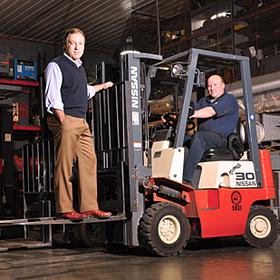Bruce Quay knew he was signing up for a heavy lift when he acquired Capitaland Material Handling Inc. three yea...
Bruce Quay knew he was signing up for a heavy lift when he acquired Capitaland Material Handling Inc. three years ago.
Quay saw promise in the business, which sold, rented and serviced forklifts. But nothing was geared toward growth—Capitaland’s sales efforts were almost nonexistent.
“The company had been playing much more defense than offense. They were challenged just to keep their current customers happy,” Quay said. “Literally, their marketing effort was a Yellow Pages ad, that’s it. And the technician and customer service staff was, candidly, weak.”
Quay has finished tranforming the Altamont company, although it took more than twice as long as he’d planned. One reason: The economy plummeted right after he bought the business.
“All our customers were off somewhere between 15 and 30 percent—not the environment you want when you buy a business,” Quay said. “I won’t ever win any timing awards.”
Growth was uneven in 2008 and 2009, but Quay expanded revenue and profits this year. He also closed the first acquisition in Capitaland’s 16-year history, which will boost revenue by 20 percent.
Capitaland acquired Northeast Forklift Repair of East Berne in October.
Quay, who declined to share his specific revenue, forecasts revenue growth of at least 5 percent in 2011, not counting a new acquisition he plans to make.
Quay said he’s invested $500,000 on sales and marketing, generating two versions of a website, installing back-office software and other efforts.
The figure excludes the internal financing and aid from M&T Bank used to complete the recent acquisition.
Capitaland will add two employees as a result of the deal. Quay had earlier cut about a dozen of the 15 employees he inherited and has since replaced all of them.
Quay also had his own adjustments to make, having spent his career in executive jobs at much larger area companies.
He has been a top executive at pool manufacturer Latham International Inc. (then owned by a company called Cookson), water-park developer Aquatic Development Group Inc., in Cohoes, and Integrated Alarm Service Group, a publicly traded alarm-monitoring company in Albany that was acquired by a Kansas firm in 2007.
“I was frankly tired of traveling constantly. I wanted a regional company, and second, I wanted an industry that had stability,” Quay said. “There’s no great technology replacing the forklift anytime soon.”
Perhaps the most fundamental change Quay has made is that Capitaland now banks on maintenance and repair for the majority of its revenue. The company has backed off from relying too much on the sale of new forklifts, which came to a near-halt as the recession set in.
“There’s been such a constraint on new cap-ex spending. What does that mean? Companies become even more focused on prolonging the life of their existing assets, and that plays right into our strength,” Quay said.
Capitaland has 250 customers, the vast majority coming from the manufacturing, distribution and retail sectors.
Customers range from Saratoga Hospital to drug researcher Albany Molecular Research Inc. to the Regional Food Bank of Northeastern New York. No client accounts for more than 8 percent of business.
The maintenance focus was a key reason why Northeast Forklift Repair became a prime acquisition target.
Another advantage: Northeast’s service territory fell entirely within Capitaland’s range, a 75-mile radius around Albany.
Capitaland gained 50 new customers in the deal, a 20 percent increase; Quay declined to disclose the purchase price.
“They are strictly service and repair, so this deal was a perfect situation for us,” Quay said. “I could fold his customer base into mine with very little additional fixed cost.”
The parts and repair business has remained steady during the recession, said John Nofsinger, CEO of trade group Material Handling Industry of America, in Charlotte, North Carolina.
Shipments of new forklifts, though, dropped by about 55 percent just from 2008 to 2009, industry data show.
“If there’s no manufacturing, you’re not selling anything, you’re not moving any product. The spigot is on, or it’s off,” Nofsinger said. “All the planets came out of alignment.”
Still, the sector is beginning to show signs of a rebound. Nofsinger said he expects steady growth over the next four or five years, especially if factory utilization rates keep climbing and the federal government extends or expands tax depreciation for businesses.
“It will start to feel a lot friendlier,” Nofsinger said.
Quay isn’t idling and waiting for forklift purchases to pick up. He competes against larger regional firms such as Thompson & Johnson and Tri-Lift, which both have branches in Colonie.
At least one offers commercial floor cleaning equipment, a product line Quay added in 2009 as the latest potential lift to the revenue base.
The machines tie in well with forklifts because technicians use similar skills to repair both, Quay said. He expects to focus on promoting the sale, lease and service of cleaning equipment in 2011.
“It’s one of our biggest growth opportunities,” Quay said, noting that schools, hospitals and big-box retail stores are all potential customers.
“I anticipated spending six to nine months to get this reorganized, but it took more like 12 or 18 months to get where I need it to be,” Quay said. “Now, I can start spending even more time on business development.”







 粤公网安备 44010602003952号
粤公网安备 44010602003952号